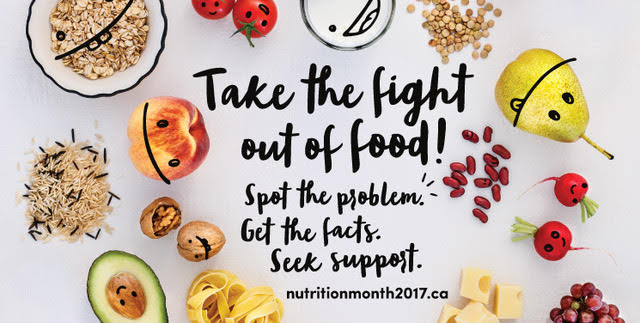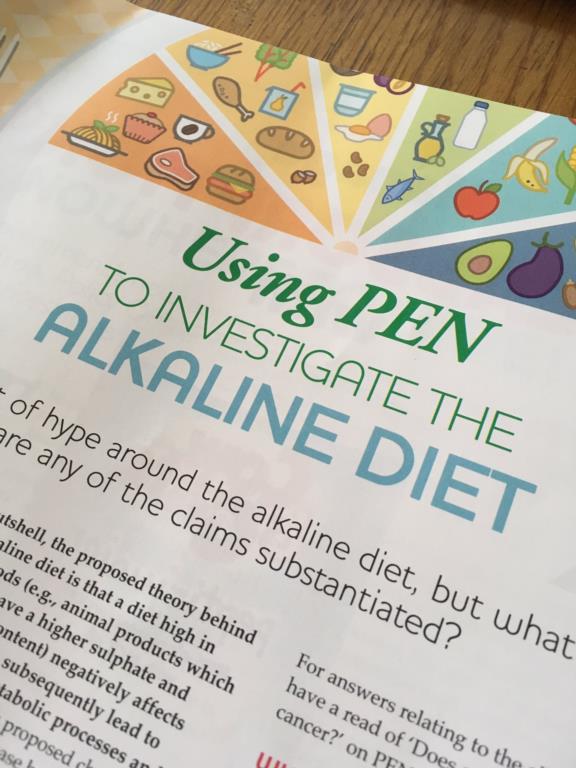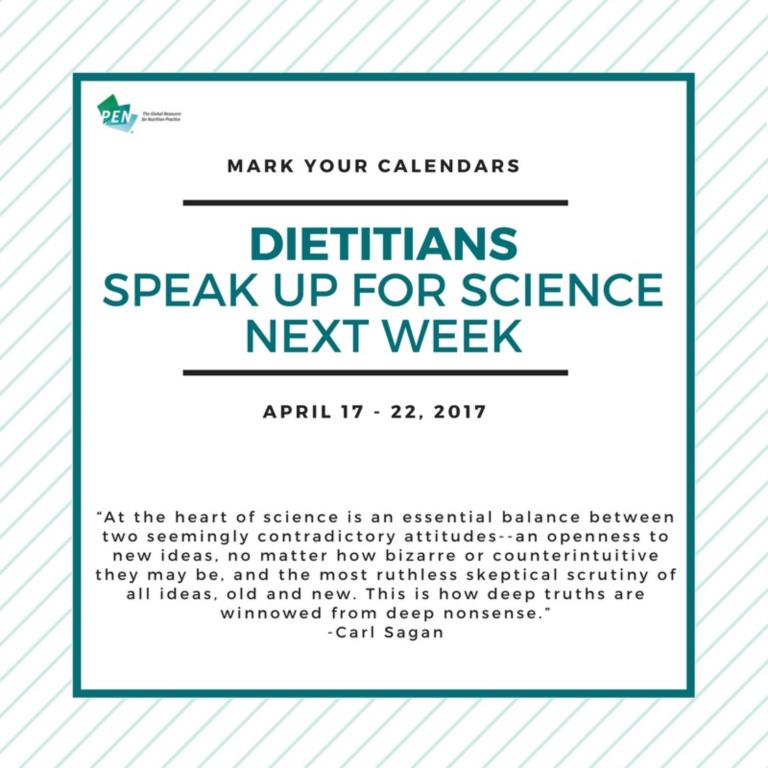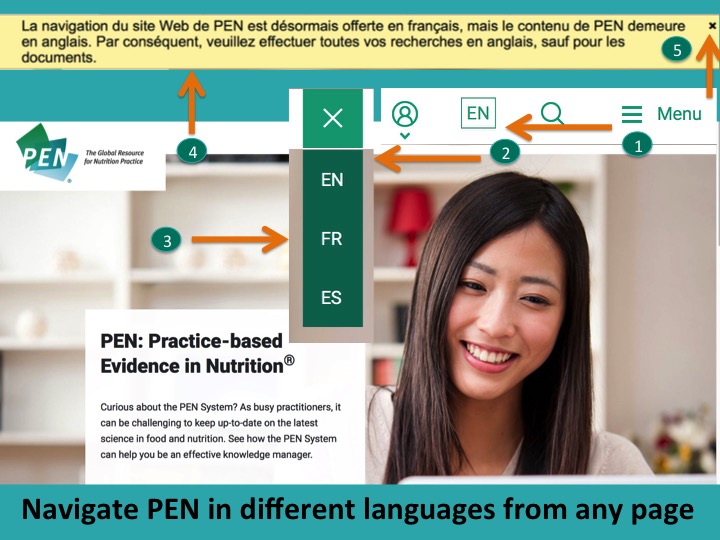PEN eNews 7(1) June 2017
PEN
® eNews is a monthly e-newsletter shared with the global PEN Community and created to help dietitians position themselves as leaders in evidence-based nutrition practice. In addition, users of the PEN System will find articles on the new evidence, resources and features available and how to maximize one's use of PEN.

Welcome to PEN® eNews
Dear PEN Community,
I am delighted to serve as the guest editor for the next few issues of PEN eNews.
I recently read an excellent article by Benjamin Djulbegovic and Gordon Guyatt entitled Progress in evidence-based medicine: a quarter century on (1). It is always enjoyable to look back on how we got to where we are – it helps us appreciate the solid foundation upon which evidence-based practice is built.
I’m proud of our profession and how we’ve embraced evidence-based practice. We all benefit when our recommendations are grounded on solid science.
The authors highlight three important principles of evidence-based practice:
- Not all evidence is created equal and that we should always base our practice on the very best evidence.
- The best answer or truth should be based on the totality of best evidence and not simply on research that supports what we believe to be true or wish to promote.
- When making our recommendations, we should always consider the patient’s/community’s values and preferences.
These principles are well captured in the International Confederation of Dietetics Associations (ICDA) definition of Evidence-based Dietetic Practice
|
Evidence-based dietetics practice is about asking questions, systematically finding research evidence, and assessing the validity, applicability and importance of that evidence.
This evidence-based information is then combined with the dietitian's expertise and judgment and the client’s or communities unique values and circumstances to guide decision-making in dietetics.
A consensus Statement Approved by the Board of Directors November 13, 2010.
|
The article doesn’t shy away from the criticisms of evidence-based practice such as:
- it promotes cookbook medicine,
- it ignores the personal aspects of a client’s situation or worldview and
- it undervalues a clinician’s experience or judgment.
Rather, they describe how addressing these legitimate concerns have resulted in important improvements to the evidence-based practice model. Some examples include the development of the GRADE approach to critical appraisal, recognizing the importance of patient values when making recommendations and ongoing improvements in how systematic reviews and meta analyses are conducted.
The authors also address the critical importance of filtering and disseminating or accessing the best evidence so practice can reflect new research and new knowledge. This is the essence of the PEN System… providing you with the best available evidence on topics that matter to dietitians, critically appraised using gold standard techniques, and synthesized so it is ready for use in your practice.
I love to share that the first clinical trial ever recorded, the first clinical trial of the modern era and the first Cochrane-related trial were all NUTRITION trials!
From PEN@10 presentation by J Thirsk Dietitians of Canada Conference, Quebec City, Canada, 2015
The world's first clinical trial is recorded in the “Book of Daniel” in The Bible. King Nebuchadnezzar generally required his people to eat only meat and drink only wine because he believed it was healthiest dietary pattern. When several young men challenged him and requested a vegetarian diet, he set up a 10-day trial with a group of meat eaters and a group of vegetarians. At the end of the trial, the vegetarians appeared better nourished and so he lifted the restriction that all his people be meat-eaters.
I’ve seen it cited as the first unblinded, uncontrolled human experiment that guided a decision about public health.
Turning to the first clinical trial of the modern era, we fast forward to the mid 1700s. Dr Lind, a British physician assigned to the navy, conducted his legendary controlled trial on 12 sick sailors suffering from scurvy (AKA the pirates’ disease). Controlling for as many variables as he could think of, he assigned 2 of the sailors to receive a quart of cider, 2 took 25 drops of elixir, 2 received 2 Tbsp of vinegar 3 times a day, 2 received a course of sea water, and 2 were given 2 oranges and 1 lemon each day. He carefully documented their symptoms and reported the recovery of those sailors given the oranges and lemon. I suspect we all learned about this famous nutrition trial in school. http://www.jameslindlibrary.org/lind-j-1753/
Dr Archie Cochrane describes his “first, worst and most successful trial”, which he conducted while a prisoner during the Second World War. It involved 20 subjects assigned to receive a yeast supplement in an attempt to cure the widespread edema in the camp. The results were compelling enough to convince the prison officials to provide the supplements to all prisoners. The rest, as they say is history - as we know that the Cochrane Collaboration was named in honour of his pioneering work in the evidence-based practice movement. Stavrou A, Challoumas,D
Dimitrakakisb G. Archibald Cochrane (1909–1988): the father of evidence-based medicine. Interact Cardiovasc Thorac Surg. 2014 Jan; 18(1): 121–124. Available from: https://www.ncbi.nlm.nih.gov/pmc/articles/PMC3867052/
So, nutrition questions have long-intrigued humans and provided the basis for key clinical trials over literally thousands of years!
|
We’ve made a lot of progress since then and the PEN team is excited to look to the future for new techniques and technological enhancements that will improve how we find, appraise and disseminate new evidence to the PEN Community.
In this issue of PEN eNews we learn about knowledge transfer, profile a new evidence analyst’s journey to master critical appraisal skills, use a PEN pathway to address a common practice issue and support a national nutrition campaign, and if you are a user of PEN, we invite your feedback on how we can improve PEN to better meet your practice needs.
In this issue of PEN eNews 7(1), we have the following articles:
- Hola, Kon'nichiwa, Assalaam-o-Alaikum, Hello and Welcome!
- Nutrition Month 2017 Focus: ‘Take the Fight out of Food!’
- Using PEN to investigate the Alkaline Diet
- The 4 Defining Characteristics of Knowledge Translation
- Dietitians Speak Up for Science
- Wowsers – now I’m a PEN International Evidence Analyst!
- How do I… change the language used to navigate the PEN site?
Enjoy PEN eNews 7(1)
A Publication of the PEN® System Global Partners, a collaborative partnership between International Dietetic Associations. Learn more about PEN.
References:
- Djulbegovic B, Guyatt GH. Progress in evidence-based medicine: a quarter century on. Lancet. 2017 Feb 16. [Epub ahead of print] Abstract available from: https://www.ncbi.nlm.nih.gov/pubmed/28215660
Written by: Jayne Thirsk RD, PhD, FDC
Director of PEN®
PEN® eNews may contain links to other external websites. www.pennutrition.com is not responsible for the privacy practices or the content of such external websites. Neither Dietitians of Canada, nor any dietetic associations contributing to or licensing the content in Practice-based Evidence in Nutrition: PEN® endorse the content, products or services on other websites.
Hola, Kon'nichiwa, Assalaam-o-Alaikum, Hello and Welcome!
Over the past year, our PEN Community and
global usage of PEN has grown a little larger! We had

a wonderful time in Granada, Spain last fall at the International Congress of Dietetics. We were excited to welcome our Spanish colleagues from the Centro de Análisis de la Evidencia Científica de la Fundación Española de Dietistas-Nutricionistas (CAEC-FEDN) who have been very busy promoting the PEN System and extending the awareness of PEN evidence through their very active social media channels. Learn more about their organization from their
website.
This year we are also excited to welcome six new Japanese universities to the PEN Community, with m

ore expected to join in the coming weeks. We hope that the PEN System will prove to be a valuable resource for students in Japan who are training to become dietitians. For more information about The Japan Dietetic Association see their
website.
Our newest PEN community colleagues are from the Pakistan Nutrition and Dietetics Society and we look forward to engaging with them. Learn more about the Society from

their
website.
Wherever we practice, our passion for evidence advances the profession around the world.
What's New in PEN®
Below is a quick glance at some of our new and updated content. Look for the new

and updated

symbols in PEN
® System to see more new and enhanced content!
Updated Practice Questions
Professional Tools
Client Tools
Trending Topics
Nutrition Month 2017 Focus: ‘Take the Fight out of Food!’
The 2017 Dietitians of Canada Nutrition Month campaign focused on improving one’s relationship with food. Research shows that 49% of the public turns to the internet for nutrition or health information. We also know that Dr. Google and the info on the internet aren’t a lways reliable. We focused the campaign on a 3-step approach: Spot the problem. Get the facts. Seek support. Dietitians, like-minded organizations and the public alike joined in Nutrition Month from coast to coast like never before!
lways reliable. We focused the campaign on a 3-step approach: Spot the problem. Get the facts. Seek support. Dietitians, like-minded organizations and the public alike joined in Nutrition Month from coast to coast like never before!
We used five main examples with PEN approved content. We featured top issues people contacted Eat Right Ontario and Health Link BC (two of our Canadian Dietitian Contact Centres) about. We used our pledge tool and certificate for those taking part to publicly declare their commitment, which added a “call to action” element for dietitians to feature with their Nutrition Month activities. The five main examples were:
-
Food Fads: Ugh! How do I know which nutrition information to trust?
-
Digestive Woes: Eek! What’s causing all this gas?
-
Picky Eating: Grr! Why is family mealtime such mayhem?
-
Eating and Stress: Help! Why do I always turn to food when I’m stressed?
-
Managing a Condition (e.g. diabetes): Sigh! How can I manage my diabetes?
This provided Canadians with common examples for taking the fight out of food!
The campaign was launched with our press release on February 22 with swift media pickup through to March 31. Dietitians participated in hospital settings, businesses, fitness centers, universities, schools, government agencies, grocery stores and more. Dr. Jane Philpott, federal Minister of Health, participated by releasing a letter promoting the campaign. We had 22 regional representative teams who organized 400 events across Canada reaching over 200,000 Canadians. We had 23 spokespeople who faced the media with our array of key messages in English, French, Chinese and Urdu. The campaign garnered over 71 million media impressions (an increase of 19% from 2016) and 407 stories (an increase of 28% from 2016) the widest reaching Nutrition Month campaign ever by Dietitians of Canada (since 1982). In fact, the past three campaigns broke records for media impressions and number of stories consecutively. We trended on Twitter Canada March 1st and on Dietitians Day and hit the number one trending topic during that day. There were 246,036 combined Nutrition Month documents downloaded from the Dietitians of Canada website (an increase of 515% since 2016) with a distribution of over 1.6 million documents.
Check out the Nutrition Month sizzle reel: https://youtu.be/J_p30iOppeU

Campaign reflections
When I was a nutrition student, decades ago, the issue of “nutrition misinformation” lit my fire within. I hoped that in some way the tide would shift in a positive way at some point during my career. Fast-forward 30 years to today and I realize that this is an even greater issue now, than ever. Good grief! I strongly believe all of us need to fight for evidence-based nutrition. I will divulge I participated in the March for Science in my city! Banding together to “bang the gong” using evidence-based key messaging is not only important in Nutrition Month, but every month! It will certainly take more than a village to turn this tide.
I’m committed to improving and building on each Nutrition Month campaign. We need to make it more relevant, far reaching and encourage everyone to take part any way they can. We need to claim Nutrition Month as ours as if our future depends on it, because it does. So if you haven’t taken part in Nutrition Month lately, consider joining in next year’s campaign. Pick up your mallet and bang the gong!
Oh what a beautiful noise!
Francy Pillo-Blocka RD FDC
Food & Nutrition Communications
Thick and Thin Enterprises
Nutrition Month Manager, Dietitians of Canada
LinkedIn | Blog | Twitter
Using PEN to investigate the Alkaline Diet
This article was originally printed in Dietetics Today, a publication of the British Dietetic Association in April, 2017. It is reprinted here with permission.
There has been a lot of hype around the alkaline diet, but what is the theory behind it and are any of the claims substantiated?
In a nutshell, the proposed theory behind the alkaline diet is that a diet high in acidic foods (e.g., animal products which

typically have a higher sulphate and phosphate content) negatively affects the body’s pH, which can subsequently lead to detrimental changes in metabolic processes and increase mineral losses. This proposed chronic disruption of the body’s acid-base balance promotes the risk of ill-health. Advocates of the alkaline diet claim that by consuming a diet high in alkaline foods (e.g., fruits and vegetables), you prevent this acidic environment occurring. How? It is thought that by eating foods high in acidic content, and not having the correct balance of acid to alkaline foods (20/80 ratio, respectively) that the body has to overwork to neutralise the pH of the blood. It does this by releasing alkaline minerals from bone as a buffer (and how the theory between high acidic foods and osteoporosis came about). Therefore, it’s been suggested that the alkaline diet may prevent bone loss and fractures.
What does the evidence say?
It is suggested that a diet high in protein increases the acidic load, which is associated with increased urinary calcium losses and osteoporosis risk. There is a lack of evidence of a detrimental effect of acidic load from high protein intakes on bone health. There are many regulatory factors which compensate for urinary calcium losses. Furthermore, diet is complex and many nutrients play a role in bone health. Simply isolating individual effects of single nutrients does not account for overall diet quality or the complex interplay of nutrients which collectively influence bone health. For more information, have a look at the answer to
‘Is the acid produced from the modern Western diet detrimental to calcium balance?’ on PEN.
For answers relating to the alkaline diet and cancer, have a read of
‘Does an alkaline diet prevent or cure cancer?’ on PEN.
What is the reality?
The reality is that the body tightly regulates pH (~ 7.4) and this cannot be altered with diet. It is true that urine pH does vary and this is to be expected as maintenance of the acid-base is regulated via kidney excretion and reabsorption. Therefore, urine pH can be influenced by diet but is not reflective of systemic pH.
Other related answers
For all other answers relating to the Alkaline Diet, check out the ‘Diet Composition – Alkaline Diet’ Knowledge Pathway on PEN. Practice Questions include…
-
Does an alkaline diet have a role in the risk, prevention, or treatment of chronic diseases such as obesity, cardiovascular disease, hypertension and diabetes?
-
Does the use of a water alkalinizer to alkalinize and ioinize tap water cure cancer?
-
Is there a role for the alkaline diet in preventing or curing depression, yeast overgrowth and cellulite?
What is the take-home message?
Well-designed, robust studies investigating the impact of the alkaline diet on health is lacking. Whilst increasing intake of fruit and vegetable intake in the general population would be seen as a good thing by many, and there is compelling evidence showing the benefits of fruit and vegetable intake on bone health, there is no scientific data to suggest sticking to the ‘alkaline food group’ will prevent ill health. It’s well established that not meeting dietary recommendations will influence health status, but oversimplifying this with acid and alkaline food lists is neither helpful nor accurate. Focusing on improvements in overall diet quality in line with the Eatwell Guide is recommended for optimal health.
Written by:
Sammie Gill BSc (Hons), R.SEN, RD, PhD
Policy Officer (Evidence-based Practice)
British Dietetic Association
globalpen@bda.uk.com
The 4 Defining Characteristics of Knowledge Translation
What is KT?
PEN is described as a knowledge translation (KT) tool, but have you ever wondered what this means? Knowledge Translation is a term increasingly used in healthcare to describe the methods of closing the “know-do gap” (1). Over 100 other distinct but related terms have also been used interchangeably to describe the same concept, these include knowledge transfer, knowledge exchange, research utilization, implementation science, dissemination and diffusion (2).
Box 1:
“a dynamic and iterative process that includes synthesis, dissemination, exchange and ethically-sound application of knowledge to improve the health of Canadians, provide more effective health services and products and strengthen the health care system”3 |
The oft-cited definition by the Canadian Institutes of Health Research (CIHR) in Box 1 emphasizes the following 4 key characteristics of KT (3):
- A complex process of change: KT is not a linear process whereby knowledge is passed from researchers to users in a step-wise fashion but a dynamic and iterative process that involves interaction between the context and multiple stakeholders. To better understand this complex process of change, numerous theoretical models and/or conceptual frameworks for KT have been proposed (4).
- Broad view of knowledge: In KT, ‘knowledge’ is predominantly conceptualized as empirically derived (i.e. scientific/research based) but may also require the utilization of tacit knowledge (i.e. contextual and experiential knowledge).
- KT involves all steps from creation of new evidence to its implementation. These 4 steps include:
- Synthesis: interpreting research findings in the context of the wider body of knowledge on the topic.
- Dissemination: communicating and sharing research evidence and tailoring the message to appropriate audiences.
- Exchange: collaboratively sharing knowledge between researchers and end users (e.g. patients, decision-makers, clinicians), and engaging users in the research process.
- Ethically-sound application: methods of implementing knowledge into practice while adapting the knowledge and/or KT activity to align with the prevailing values, norms, legal standards and culture of the context and user.
- The overall goal of KT is to achieve impact at both the individual and population level.
Why is KT important?
Knowledge translation is much more than a trendy buzzword. Over the past 2 decades KT has emerged as an independent scientific discipline with the overall goal of enhancing the uptake of research findings. Currently, it is estimated that 35-55% of patients are not receiving care according to audits of compliance with evidence-based guideline recommendations (5). Furthermore, there is considerable delay in the utilization of original research, taking 1 to 2 decades to be incorporated into routine practice (6). As dietitians, it is not enough to know that a nutrition intervention is effective; it is also necessary to understand how the intervention works, for whom it works, in which contexts, and to address the barriers and enablers of effectiveness under real-world conditions. This is not an easy task but KT tools and products (such as PEN) are available to support practitioners in facilitating change (7).
As a global dietetic community, bringing awareness to and engaging in the science of KT is integral to successfully overcoming the profound challenge of translating evidence into high quality, impactful and sustainable practice.
References
-
Straus SE, Tetroe JM, Graham ID. Knowledge translation is the use of knowledge in health care decision making. J Clin Epidemiol. Jan 2011;64(1):6-10. Abstract available from: https://www.ncbi.nlm.nih.gov/pubmed/19926445
-
McKibbon KA, Lokker C, Wilczynski N, et al. A cross-sectional study of the number and frequency of terms used to refer to knowledge translation in a body of health literature in 2006: a Tower of Babel? Implementation Science. 2010;5(1):16. Abstract available from: https://www.ncbi.nlm.nih.gov/pubmed/21080976
-
Canadian Institutes of Health Research. Knowledge Translation. 2016. Available from: http://www.cihr-irsc.gc.ca/e/29418.html#3
-
Estabrooks CA, Thompson DS, Lovely JJ, Hofmeyer A. A guide to knowledge translation theory. J Contin Educ Health Prof. Winter 2006;26(1):25-36. Abstract available from: https://www.ncbi.nlm.nih.gov/pubmed/16557511
-
Fischer F, Lange K, Klose K, Greiner W, Kraemer A Barriers and Strategies in Guideline Implementation-A Scoping Review. Healthcare. 2016 4(3) 36. Abstract available from: https://www.ncbi.nlm.nih.gov/pubmed/27417624
-
Sussman et al Translation in the health professions: converting science into action. Eval Health Prof. 2006 29:7-32 Abstract available from: https://www.ncbi.nlm.nih.gov/labs/articles/16510878/
- Brouwers M, Stacey D, O'Connor A. Knowledge creation: synthesis, tools and products. CMAJ. 2010 Feb 9;182(2):E68-72 Abstract available from: https://www.ncbi.nlm.nih.gov/pubmed/19884300
Additional Resources
Written by:
Naomi Cahill RD PhD
e-mail: naomiecahill@gmail.com
Twitter/Facebook/Instragram: @naomiecahill
PEN Users - We Want Feedback!
Help us make the PEN System even more valuable to your practice. 
Whether you are a new PEN user or an experienced “pro”, we’d like to hear from you.
What parts of the PEN system are most useful to you, what isn’t, what do you like, where do we need to improve… Take the short survey now: https://www.research.net/r/LWMVYK5 Your comments count!
Dietitians Speak Up for Science
April 22, 2017 was Earth Day and it was also March for Science, a day when people and science organizations big and small celebrated the vital role science plays in our lives. Over 6 00 marches took place in cities around the world and we’ve heard that Dietitians participated in several of them!
00 marches took place in cities around the world and we’ve heard that Dietitians participated in several of them!
Inspired by these science organizations, the PEN team shared why science is important to them and invited Dietitians to do the same virtually, either by contributing their personal thoughts, or by re-tweeting those of the PEN team and followers. Here is a sample of what we heard and how dietitians participated: https://storify.com/PENSocial/dietitians-march-for-science
|
“This march is an embodiment of our values—to use evidence to lead to better decisions and better health.” Cochrane Co-Chair Professor Lisa Bero
|
We had over 45,000 impressions on Twitter and almost 140,000 on Facebook related to our March for Science campaign during the week of April 17-22.
And yes, even Penguins marched for science!
https://www.facebook.com/montereybayaquarium/videos/10155185097032482/

Wowsers – now I’m a PEN International Evidence Analyst!
My experiences in the field of nutrition and dietetics have certainly been far and wide over the past 20 years. Some of my more memorable jobs and career highlights include:
- The ‘Truckie Dietitian’ - government and private funding was sourced to run
 ‘Healthy Eating on the Road’ – a healthy eating initiative for truck drivers in Australia.
‘Healthy Eating on the Road’ – a healthy eating initiative for truck drivers in Australia.
- The ‘Tick Chips’ dietitian – the National Heart Foundation of Australia took me on as a project officer to pilot a food approval program in the takeaway food sector.
- The ‘Grains and Legumes’ Dietitian – here I worked as a corporate dietitian with Go Grains (since renamed the Grains & Legumes Nutrition Council) to promote the evidence-based nutrition & health benefits of eating grain-based foods and legumes.
- The Freelance Nutrition Writer – over a 5 year period I contributed to a segment called ‘Ask Our Dietitian’ and editorial articles in Good Health (a national health & wellbeing magazine).
- The Policy and Advocacy Dietitian – in this current part-time role with the Dietitians Association of Australia, I work closely with the Senior Policy Officer in advocacy and representation to influence government agencies and other stakeholders.
When the opportunity arose to become an Evidence Analyst for PEN, I sat and pondered….Can I do this? Do I have sufficient know-how to take on this role? Do I really need to challenge myself again by taking on a new task? The answer to all three questions was a resounding ‘yes’. I was up for the challenge and keen to add a new set of skills under my belt. So here I am now, a part-time (8hr/week) PEN International Evidence Analyst, based ‘down under’ in Australia.
My starting point was a comprehensive orientation of PEN (with assistance from the fabulous PEN team) and a recap on how to critique the evidence. This included a refresher on:
- the hierarchy of evidence (i.e. systematic reviews and meta-analysis > RCTs > control studies etc).
- the evidence grading system (good, fair, limited, poor evidence).
- how to conduct effective searches using different databases and MESH terms (note: PubMed online tutorials are extremely helpful).
My next step was to:
- learn how to write Knowledge Pathways (KP’s) using the PEN format/style guide.
- review, understand and apply the PEN Grading of Recommendations, Assessment, Development and Evaluation (GRADE) process.
With these new skills under my belt I was tasked with updating the 11 questions in the paediatric constipation pathway and 1 question in the lactose intolerance pathway, applying the PEN GRADE process to five of these questions. These are currently out for international peer review, but look for this content in the PEN system in the coming months. At present I am working on 5 questions in the eating disorders pathway, again applying the GRADE process.
The process to becoming a competent Evidence Analyst has admittedly been a steep learning curve, although a very rewarding one. I’d highly encourage anyone to step outside their comfort zone and challenge themselves by learning a new set of skills. As they say ‘If you never challenge yourself, you will never know your potential’.
Written by,
Vanessa Schuldt
B.Sc., M.Sc. (Nutr & Diet), APD
Email: pao@daa.asn.au
How Do I…Change the language used to navigate the PEN site?
Written by Beth Armour MEd, RD
Dietitians of Canada
PEN® PEN Content Manager
On the login page, Home page or any page in the PEN database you can change the language of navigation to French, Spanish or Japanese (coming soon).
Looking at the picture:
 Step 1
Step 1
On the upper right hand side tool bar find the EN / FR / ES / JA icon; this will vary depending on which language was used the last time you logged in.
Step 2
Click on the icon and you will get a drop down menu
Step 3
Choose the language you want
Step 4
There will be a message reminding you that while the navigation is in different languages searches must be done in English
Step 5
You may close this message by clicking in the X in the upper right hand corner of the message box
Questions? Contact Us.
Knowledge Transfer Events and Resources
Conferences
Centre for Evidence-based Medicine: Teaching EBM
Oxford, England, September 11-14, 2017
http://www.cebm.net/teaching-evidence-based-medicine/
European Federation of the Associations of Dietitians Conference
Rotterdam, The Netherlands, September 29-30, 2017
http://efadconference.com
International Congress of Nutrition
Buenos Aires, Argentina, October 15-20, 2017
http://www.icn2017.com
International Congress of Dietetics (ICD)
Cape Town, South Africa, September 15-18, 2020
http://easternsun.eventsair.com/QuickEventWebsitePortal/icda-congress-2020/icd2020
Other Resources
Knowledge Translation Canada – Using Social Media to Improve Dietary Behaviours
http://ktcanada.org/education/seminar-series/seminar-series-january-12-2017/
Breitenstein, S.M., Gross, D., Garvey, C.A., Hill, C., Fogg, L., & Resnick, B. (2010). Implementation fidelity in community-based interventions. Research in Nursing & Health, 33, 164-173. Available from:
https://www.ncbi.nlm.nih.gov/pmc/articles/PMC3409469/pdf/nihms231905.pdf
Healthy habits, healthy weights: A walkthrough of the Evidence-Informed Public Health process. Available from:
http://www.ohpe.ca/node/18497
Three nutrition trends to stay away from – based on the best evidence
http://evidencenetwork.ca/archives/32729How artificial intelligence will shape systematic reviews in the future. A peek at Cochrane’s Transform Project.
http://www.cochrane.org/news/how-cochrane-using-microsoft-technology-improve-efficiency-systematic-review-production
Contact Us
Do you have comments, questions or feedback? Please contact us:
Jayne Thirsk RD, PhD, FDC
Director of PEN®
Dietitians of Canada
jayne.thirsk@dietitians.ca
Sammie Gill BSc (Hons), SENr Graduate Registrant, RD, PhD
Policy Officer (Evidence-based Practice).
British Dietetic Association
globalpen@bda.uk.com
Maree Hall, APD
Senior Public Relations Manager
Dietitians Association of Australia
prmanager@daa.asn.au
PEN eNews
June 2017 Volume
7 (1)
A Publication of the PEN® System Global Partners,
a collaborative partnership between International Dietetic Associations.
Learn more about PEN.
Copyright Dietitians of Canada
. All Rights Reserved.